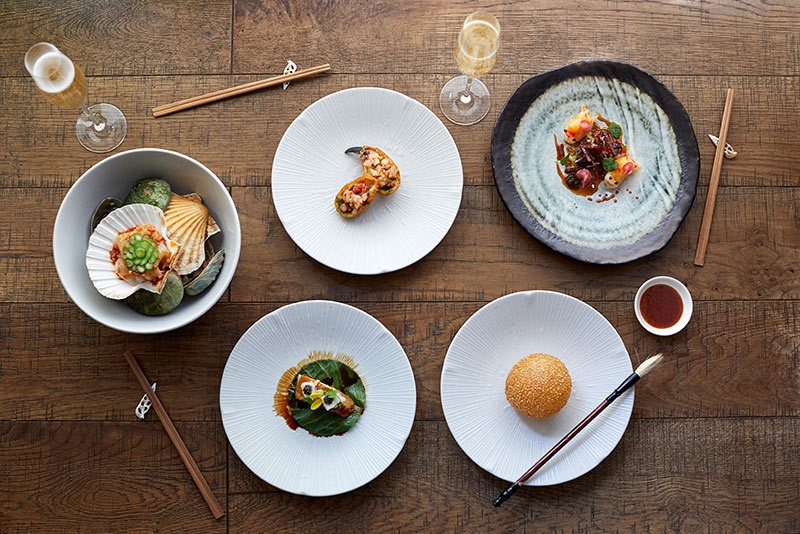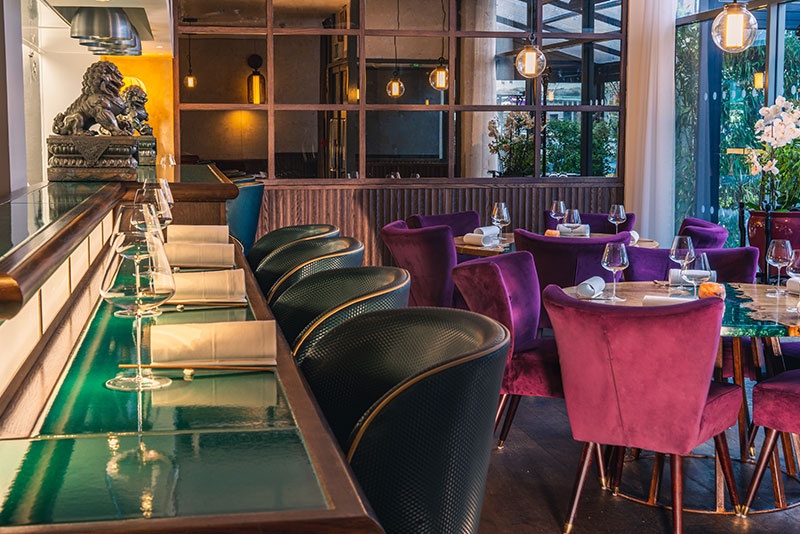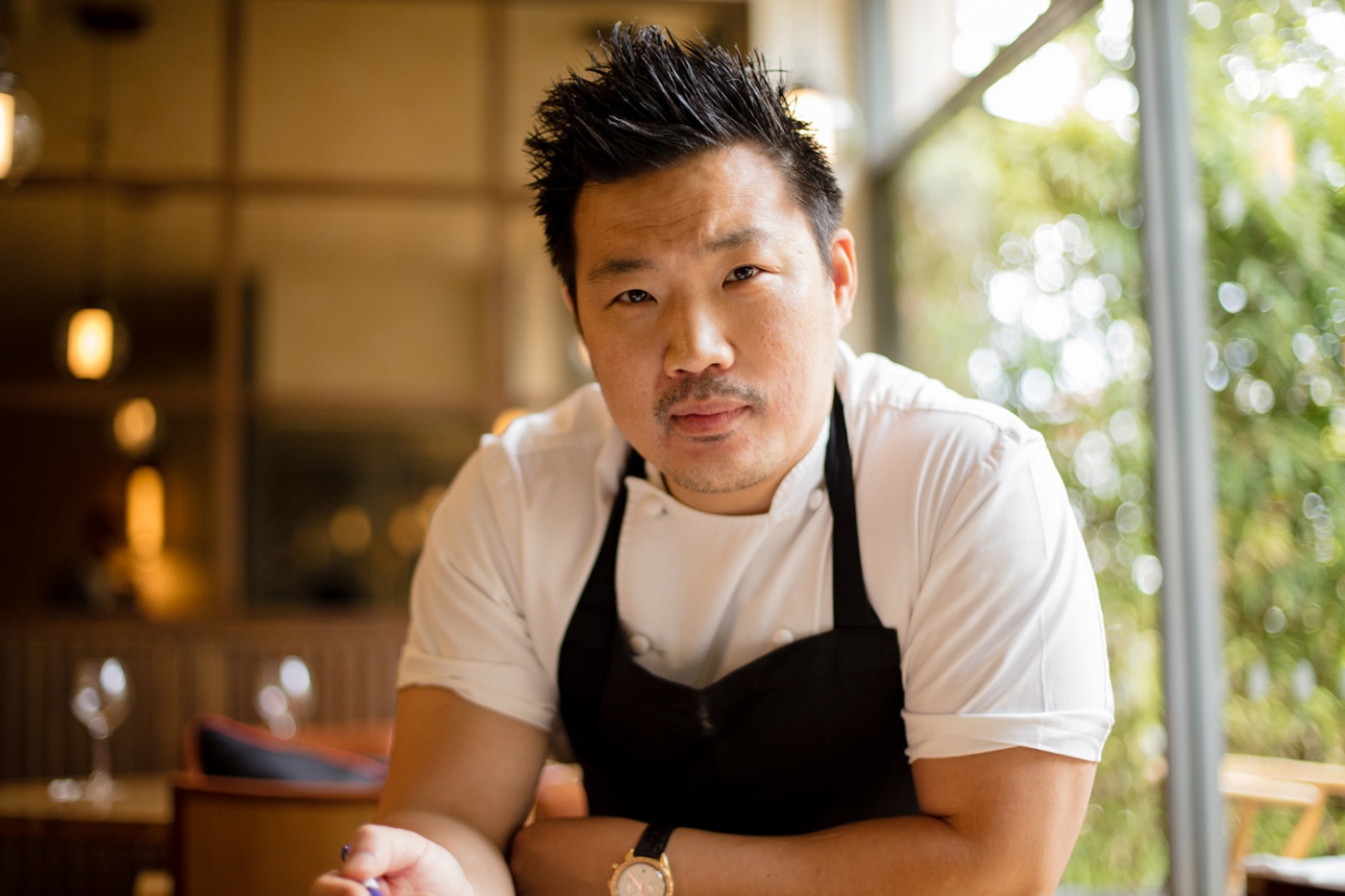2-Michelin-Starred Chef Andrew Wong on What and Where He Eats
It’s one thing to cook Chinese food in London. It’s another to be lionised as a Michelin-starred establishment—the first Chinese restaurant outside Asia to have that title. While British-born chef, anthropologist and cultural observer Andrew Wong is proud of that accomplishment, being a parent matters more. “Between service, I will go home and tell the kids that I’m still alive, and that they still have a father,” says Wong, who contends between family life and his cause towards reinterpreting Chinese historical gastronomy.
None of this was on the cards for Wong, though. In his youth, he was strongly encouraged by his second-generation immigrant parents to pursue a more academic route. Serendipitously, a turn of events pulled him back to his family’s restaurant in Pimlico. Eventually, his hovering curiosity about the cultural profile of Chinese food led him on a year-long gastronomic pilgrimage through the People’s Republic of China in 2010. After his travels, Wong parlayed his findings into compelling dishes. While they are not 100 per cent authentic, it is very much Wong’s personal interpretation of the country’s culinary diversity, which also recognises cultural and regional differences.
“China’s gastronomy is one of the oldest in the world and I wanted to find a menu to celebrate that,” says Wong. Well-travelled epicureans fell in line and his eponymous restaurant A. Wong was awarded a Michelin star in 2017 followed by its second in the 2021 Guide. Outdoing himself again, we caught up with the chef to find out about his daily schedule in and out of the kitchen, the intricacies of Chinese cuisine and must-eats in London.
 Photo by David Cotsworth
Photo by David Cotsworth
High Net Worth: Tell us more about your culinary pilgrimage to China back in 2010. Was there a lot of planning involved prior to the trip?
Andrew Wong: It happened very organically. There wasn’t anything set in stone apart from the four major stops: Szechuan, Qingdao, Beijing and lastly, Hong Kong. In Szechuan, there were a few chefs standing outside the restaurant and I asked if I could hang out. They said ‘why’ very quizzically. After a couple more meals at their place, they gradually agreed to let me into the kitchen. Prior to that, I’ve never been to Szechuan and was eager to learn about their cuisine. To be honest, it’s very easy to savour Szechuan cuisine, there are restaurants here in London. But when you’re in the province, there’s something very special about it. Take having a hotpot for example, you spend the whole night eating it. It’s wild but if you take into account the work-life balance of the Szechuan people, the humidity in summer and what they drink throughout the night—it kind of makes more sense.
At the end of the day, it’s not about collecting recipes, it’s about understanding how people interact with their cuisine. Once you understand the ideology behind what makes certain dishes so important, the interpretation becomes more relevant and impactful.
Most embarrassing moment in the kitchen during that trip?
One thing I’ve learnt is that where culinary techniques are concerned, there’s no such thing as embarrassing yourself. Once I witnessed people using washing detergent to scrub the skin of the pig to remove the oils before roasting. There was another time in Shandong where I asked for a bowl of rice in a restaurant only to be told by the service staff that they do not serve rice. Turns out that Shandong cuisine specialises in breads and noodles (the colder, drier north favours wheat production).
Where Chinese cuisine is concerned, it’s no holds barred. It’s one of the most beautiful cuisines where you can and should use any means possible to achieve the best results. Whether it is having a flame thrown right in the middle of your kitchen or a barbecue that is part gas and part charcoal, I’ve observed them all in Chinese kitchens. There isn’t a rigidity, unlike Western kitchens where steps are dictated for no reason. People are improvising constantly in the kitchen and methods are manipulated to achieve the desired effect on the final product. That’s the essence of Chinese cuisine—it truly is magical.
What was the most mind-blowing culinary revelation you had during the trip?
Crispy Chicken was the most magical thing I’ve learnt along the way, without an oven. I’ve grown up in a culture where you cook chicken in an oven—and all of a sudden you’re told that you can make it so much better without one. Crispy pork belly sits high up there too! In Shandong, I had the most delicious barbecued beef tendons that had the texture of squid, together with barbecued fish and ciabatta. Who knew they ate ciabatta in Shandong? Then of course there is Wanton soup in Hong Kong. Bamboo noodles made with just duck eggs and high gluten flour are rolled out as masters bounce on the end of a bamboo pole. The texture of the noodles alone was one of the most amazing revelations I’ve ever had.
Take us through a typical day for you, food-wise.
I get up at 8 a.m. and take the kids to school. Next, I would usually hit the gym for half an hour before heading to work. Breakfast is usually something I find in the fridge, like leftover Chinese buns. The day starts off like clockwork by making har gow, then char siew bao or some other form of dim sum. Following that, I would normally cook the staff meal or let someone take care of that. 11:30 a.m. is when all the tastings would come up, from sauces to dumplings. 11:45 a.m. is when the briefing commences before service starts at noon. This runs till 3 p.m. when the next staff meal gets prepared. I usually go home during the downtime just to remind the kids that their dad is still alive and head back in again at 5:30 p.m. to set up for another service.
What about dinner?
It’s usually a midnight snack, preferably instant noodles with anything random in the kitchen. Other times, it is takeout. We get takeout because first, we’re lazy. Second, we are a restaurant that wants to support our neighbours like the Indian restaurant, two doors down or the Turkish restaurant. Bedtime is 2–3 a.m. after I’ve answered my emails and finished a bit of research. This all while handling messages from my staff telling me that they are dying and can never come into work ever again. It’s a daily struggle.
What’s your guilty indulgence?
I love instant noodles. To be exact, I love all noodles: ramen, stir-fry, soup, braised. Well, then there’s grilled lamb chops from this Pakistani restaurant that I visit regularly. Shish kebabs, fried chicken, crispy chicken, crispy pork belly. There’s very little food that I don’t like. I love everything about dim sum too; from making it to talking about it and eating other peoples’.
If you had friends visiting London, where would you take them to eat?
If it’s a single trip, I would give them a good mix of what London has to offer. I’ll start off with the Sri Lankan restaurant, Hoppers. Then it is either Core by Clare Smyth or Claude Bosi at Bibendum for some high-end dining. Finally, the last stop is a local family-run restaurant like Maxim Ealing or Brick Lane Beigel Bake. The latter has to be done at 3 in the morning just to show them that these are the only restaurants open 24 hours a day. I also love the fact that they are family-owned.
What’s your best food memory?
If I’m going to be sentimental then I would have to say my grandmother’s cooking. However, the Peking duck skin at Da Dong 大董 in Beijing was a truly ‘oh shit’ moment that remains rousing even up till today. There was also the crispy skin chicken that came straight out of the blistering oil in a wok at Above and Beyond in Hong Kong. It’s amazing how they took something as simple as a chicken and elevated it to ultimate deliciousness.
 Photo by David Murray
Photo by David Murray
Perks of growing up in a restaurant?
Number one, you get to meet a lot of people. When I first started helping out in the family restaurant in the 80s, there were tons of South American, Eastern European and Italian staff. Growing up, I had a lot of interaction with different cultures at an early age, whereas if you were to attend a local school in London, you’re most likely interacting with a very specific demographic: the white middle-class. There’s also something very special about growing up in the kitchen. You’re constantly witnessing chefs of a very high calibre; their level of speed, together with the use of multiple ingredients on a daily basis, is very inspiring. While most of my friends’ food vocabulary revolves around carrots, celery and potato, my food dictionary comprises a wide variety of Chinese leaves and root vegetables. You don’t appreciate it at the time but you internalise it as you grow up.
Since my family was involved in the industry, we were encouraged to dine out quite a lot. One thing that has stayed with me is I’m very certain of what I like and don’t like. Even in my late teens as a budding chef, I was very comfortable with my personal opinions about dishes. I never allow them to be swayed by bloggers nor the opulence that shrouds it. This has helped me a lot in making executive decisions like what goes into the menu at A. Wong.


